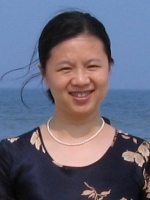

| Title: | Professor |
| Dept: | Biological, Geological and Environmental Sciences |
| Office: | SR 261 |
| Phone: | 216-687-2444 |
| Fax: | 216 687 6972 |
| Email: | B.LI37@csuohio.edu |
| Address: | 2121 Euclid Ave. SR 261, Cleveland, OH 44115 |
|
| ||||||||
| Education: | ||||||||
|
B.S., Electrical Engineering, Peking University, 1990
Ph.D., Molecular Biology, Cornell University Medical College, 1996 | ||||||||
| Brief Bio: | ||
| Dr. Li is an Associate Professor of Biological Science. She received her B.S. in Electrical Engineering from Peking University in Beijing, P. R. China and her Ph.D. in Molecular Biology from Weill Medical College of Cornell University in NYC. Bibo Li received her postdoc training with Dr. Titia de Lange at the Rockefeller University. Subsequently, she was a research assistant professor at Dr. George Cross' lab from 2002 to 2006. She has been a faculty member of Cleveland State University since 2006. | ||
| Honors and Awards: | ||
| Internal Funding and Awards
Summers in 2007-2010, 2012-2013 Undergraduate Summer Research Award April 2013, 2010, 2009, 2008 Faculty Merit Recognition Award for Research 2010-2011 Faculty Research and Development Program award April 2009 College of Science Outstanding Research Award External Funding and Awards Jan. 2013 ¿ Jan. 2016 NIH R15 grant Drug development of orally active anti-trypanosomiasis agents. PI: Su, Bin Co-PI: Li, B. Total cost: $436,500 Mar. 2011 ¿ Sept. 2012 Ohio Research Scholars Program, Co-PIs: Li & Runge CSU-CC Collaborative Cardiovascular Research Grants ¿Role of RAP1 in telomere length regulation¿ Total cost: $61,333 ($38,000 to Bibo Li, $23,333 to Kurt Runge at CC) Feb. 2011 ¿ Jan. 2016 NIH grant: 2R01AI066095, PI: Li ¿Characterize functions of T. brucei RAP1 and TRF in antigenic variation and telomere integrity¿ Total cost: $1,775,000.00; IDC: $525,000.00 (42% of Total Direct Cost) Summer 2009 & 2010 NIH grant: 1R01AI066095-03, PI: Li Administrative Supplement for Students and Science Educators under the Recovery Act. Parent grant: 1R01AI066095-03 Total amount: $17,648.00; IDC $5,225.00 March 2007 Honorable mention from OMERIS as one of the ¿30 in their 30¿s¿ doing great work in bioscience. Jan. 2007¿ Jan. 2011 NIH grant: 1R01AI066095, PI: Li ¿Characterization of trypanosome telomere complex¿ Total cost: $1,266,094.00; IDC: $258,719.00 (59% of salary and wages) July 1998¿June 2001 Leukemia & Lymphoma Society Fellowship Total direct cost: $ 110,000.00 | ||
| Research Interests: | ||
| Telomeres are nucleo-protein complexes located at ends of linear chromosomes. Although telomeres do not contain any genes, they play a pivotal role in protection of the chromosome ends from illegitimate DNA recombination, repair and nucleolytic activities. Therefore, telomeres are essential for genome stability. In addition, most organisms use a ribonucleoprotein, telomerase, to synthesize telomere DNA de novo, which solves the end-replication problem raised by conventional DNA polymerase. In several organisms, telomeres form a heterochromatic structure that can suppress the expression of genes located at subtelomeric regions. Interestingly, in quite a few microbial pathogens, genes encoding surface antigens that are essential for pathogen virulence are located at subtelomeric regions, suggesting that telomeres play an important role in regulation of expression of these genes.
My lab is interested in studying telomere functions in Trypanosoma brucei, a protozoan parasite causes the re-emerging human African trypanosomiasis, which is fatal without treatment. Current anti-trypanosome drugs are highly toxic, which greatly limits their efficacy. T. brucei regularly switch to express different major surface antigens (VSGs) to evade the host immune responses. This antigenic variation is critical for long-term infection and parasite virulence. All VSGs are expressed from loci adjacent to telomeres. Our lab has demonstrated that the telomere structure plays an essential role in regulation of subtelomere VSG expression regulation (Yang et al. 2009. Cell 137:99). We have recently found that telomere proteins also play important roles in VSG switching regulation. We are currently investigating the mechanisms of how telomere proteins are involved in regulation of antigenic variation | ||
| Teaching Areas: | ||
| Molecular biology
Genetics Molecular Genetics Human biology Epigenetics and Cancer | ||
| Professional Affiliations: | ||
| Adjunct assistant professor at The Rockefeller University
Adjunct staff at Cleveland Clinic Learner Institute Adjunct Associate Professor at Case Western Reserve University, School of Medicine | ||
| Research Grants: | ||
| Jan. 2013 ¿ Jan. 2016 NIH R15 grant
Drug development of orally active anti-trypanosomiasis agents. PI: Su, Bin Co-I: Li, B. Total cost: $436,500 Feb. 2011 ¿ Jan. 2016 NIH grant: 2R01AI066095, PI: Li ¿Characterize functions of T. brucei RAP1 and TRF in antigenic variation and telomere integrity¿ Total cost: $1,775,000.00; IDC: $525,000.00 (42% of Total Direct Cost) | ||